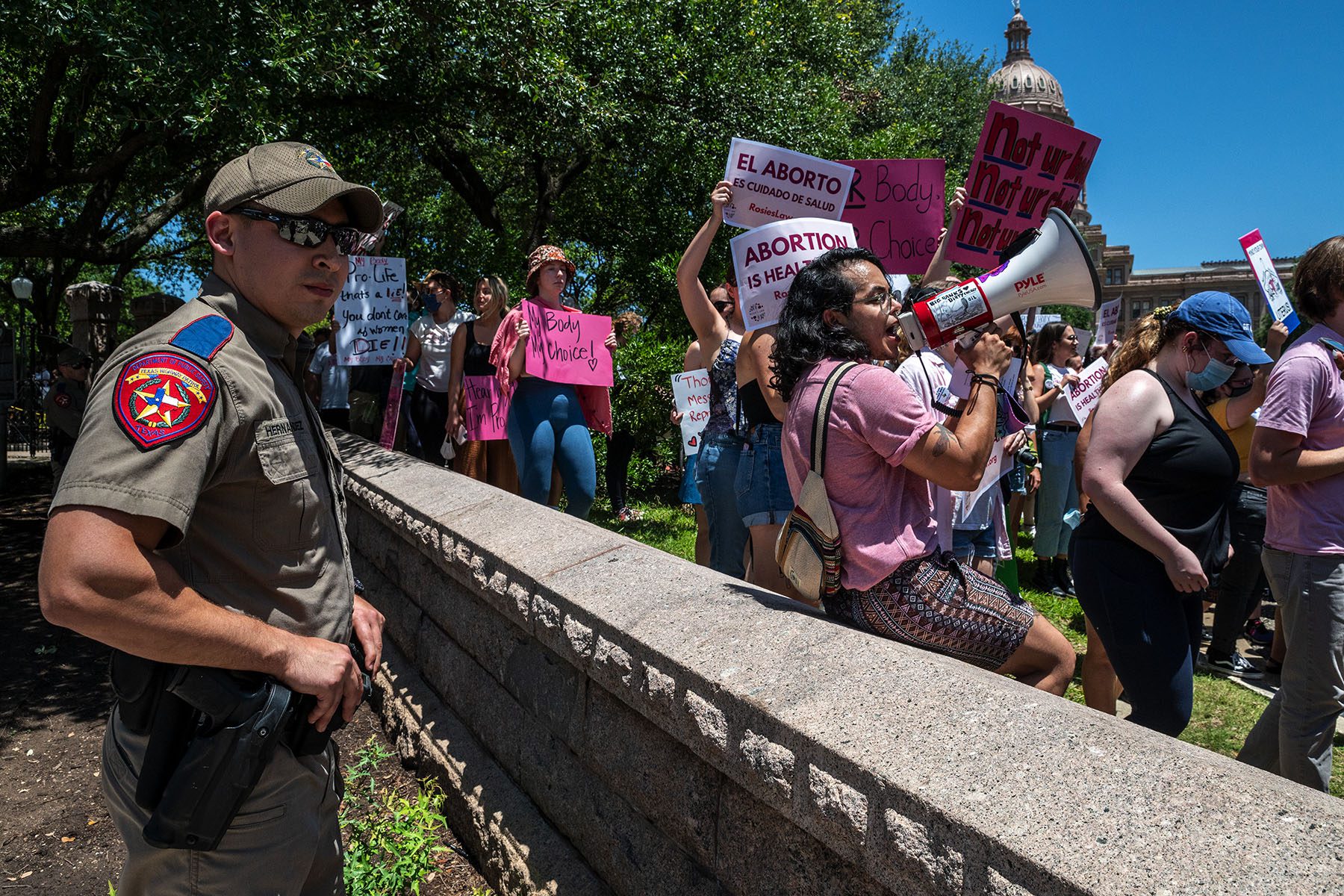Americans are split on Texas’ strict new abortion ban, with roughly equal numbers supporting and opposing it, but women far more likely to disapprove of the law, per a new national poll first shared with The 19th and MSNBC.
About 46 percent of adults support the Texas law, which bans abortions after six weeks of pregnancy and deputizes private citizens to enforce it through civil lawsuits. About the same amount — 47 percent of adults — oppose the law. The remaining 7 percent were undecided.
Adults who oppose the law are more likely to say that they feel “strongly” about their position. Democrats and independents generally oppose the Texas law, while Republicans tend to support it.
The poll was conducted from September 22 through September 24 by the national survey organizations Lake Research and Emerson College Polling in partnership with All in Together, a group that advocates for civic engagement by women across political parties. It looked at 1,000 adults across the country and had a 3.1 percent margin of error.
The poll also identified a substantial gender gap. Most men expressed support for the law, with 53 percent in favor and 42 percent in opposition. Women, by contrast, generally opposed the law: 51 percent said they disapproved of the Texas abortion ban, and only 39 percent supported it. The poll included nonbinary respondents, but not enough to break out with confidence their views on the law.
The gap illuminates a larger trend in political alignment, argued Lauren Leader, the CEO of All in Together.
“We talk a lot about political polarization, but there’s pretty significant gender polarization,” Leader said. “Women are more Democratic, more pro-choice and more progressive than men.”
Still, such a stark gender gap is relatively new to abortion politics, said Celinda Lake, the president of Lake Research and a longtime Democratic pollster.
“When the law passed there was some difference in intensity, but there wasn’t the magnitude of gender gap you’re seeing now,” Lake said. “What you’re seeing is women who are directly affected — particularly younger women — are maintaining their intensity, whereas men have shifted away from feeling as intensely about it because they tend to be less personally affected.”
The Lake-Emerson poll is one of only a few to probe the national reaction to Texas’ law, which is the strictest active abortion restriction in the country and is inspiring copycat legislation in other Republican-led states. Because the pregnancy clock starts at four weeks — when someone has missed their menstrual period — it gives pregnant people no more than two weeks to realize they are pregnant, find the money, book an appointment and often travel for an abortion. As a result, the law has effectively ended abortion access for many Texans, and has resulted in many clinics ceasing to offer any kind of abortion services.
This poll suggests a more polarized reaction to the six-week abortion ban. Other public opinion research — namely a poll by Monmouth from September 9 through 13 — had indicated much starker disapproval.
In that poll, 54 percent of Americans said they opposed a decision by the U.S. Supreme Court to let the law take effect. Key provisions of the law — in particular its reliance on private lawsuits and the $10,000 bounty — registered as especially unpopular, with about 8 in 10 saying they opposed such enforcement mechanisms.
The difference, at least in part, likely comes down to how the polls worded their questions, Lake suggested. And some public outrage has likely waned over the past several weeks, because voters may be preoccupied with other concerns, such as the economy or the coronavirus pandemic. (The Monmouth poll was conducted sooner after the law had taken effect.)
But both polls indicate that, when confronted with the details of the law, voters aren’t likely to support it.
“When you engage them in discussing the decision, and you give a sense of the provisions like ‘no exceptions for rape and incest,’ and the bounty hunter provision, then people are just really adamantly against it,” she said.
The Lake-Emerson poll suggests the abortion law — and increasing abortion restrictions more generally — could motivate Democrats and women in particular to vote in large numbers in the 2022 midterm elections. Currently, Republicans are more likely to indicate enthusiasm about voting in the next election. That’s fairly typical, since midterms usually favor the party out of power.
About 59 percent of people said they would be more likely to vote in the midterms because of the Texas law. The effect was greater for people who indicated they supported abortion access: 73 percent said they were more likely to vote next year because of the Texas law. Of people who said they oppose abortion rights, 60 percent said they were more likely to vote in the election.
Abortion rights could loom large in the midterms. Beyond the Texas law, the Supreme Court is slated to weigh in on a law from Mississippi, which would ban the procedure after 15 weeks of pregnancy. That law is currently not in effect and appears to contradict the federal abortion protections established by the 1973 case Roe v. Wade, which guaranteed the right to end a pregnancy up until a fetus can independently live outside the womb.
The Court will hear arguments on the Mississippi law in December, and is expected to issue a ruling by June or July, only months before the election.
If the Supreme Court — which has a conservative majority and is generally considered hostile to abortion rights — does uphold the Mississippi law in some form, the ruling would likely weaken or eliminate the protections established in Roe v. Wade, potentially relegating to individual states the power to ban abortions, if they choose.
Such a ruling could also drive turnout among Democrats and people who support abortion rights, the poll suggested. About 55 percent of respondents said they would be more likely to vote if the court eliminates the Roe v. Wade protection. Democrats were more likely to say so than Republicans — 66 percent compared to 45 percent. About 69 percent of people who believe abortions should be legal and available said they would be more likely to vote if Roe v. Wade is overturned, compared to 51 percent of people who believe they should be banned.
Roughly equal shares of men and women said they would be more likely to vote because of the Texas law, or because of a Supreme Court ruling erasing abortion rights. But intensity was greater for women voters — larger percentages said they would be “much more interested” in voting because of the Texas law in particular. Two-thirds of Democratic women said they would be more likely to vote if Roe v. Wade were to be overturned.
Young women, young unmarried women and suburban women also appeared particularly moved by the issue, Lake said. If that energy is sustained, it could ameliorate the advantage Republicans have.
“One of the groups we’re really having trouble with is younger voters, including younger women. This decision, plus the pattern [of abortion restrictions] could really affect turnout,” Lake said. “All groups of women could be motivated to vote based on this pattern of decisions and suburban women and independent women could be motivated to vote Democratic based on this.”







